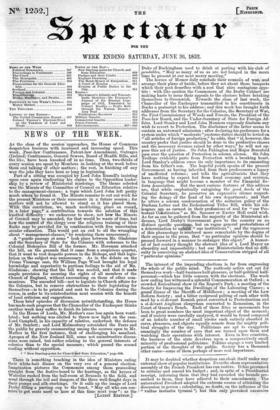The interest of the impending elections is far from engrossing
the whole of the public mind. The restlessly active cut out for -themselves work—half-business half-pleasure, or half-political half- personal—which has little concern with the elections. The week now ending has witnessed a splendid Commemoration at Oxford ; a crowded floricultural show in the Regent's Park; a meeting of the Society. for Improving the Dwellings of the Labouring Classes ; a ggrraannd dinner of the Sheriffs of Middlesex ; a meeting of the Law Reform Society • and a bitter reciprocal pelting of each other with mud by a ci-devant Romish priest converted to Protestantism and a oi-devant Anglican clergyman converted to Romanism, in the .Court of Queen's Bench. Each of these fetes or movements has been to great numbers the most important object of the moment; and if society were carefully analyzed, it would be found composed of an infinite number of small circles each entirely absorbed in cares, pleasures, and objects equally remote from the mighty poli- tical struggles of the day. Politicians are apt to exaggerate amazingly the number of eyes that are turned upon them and watching their operations with interest. Even in free countries, the business of the state devolves upon a comparatively small minority of professional politicians: Polities engage a very limited portion of the thoughts of the public. Society has a thousand- other cares—some of them perhaps of more real importance.


























